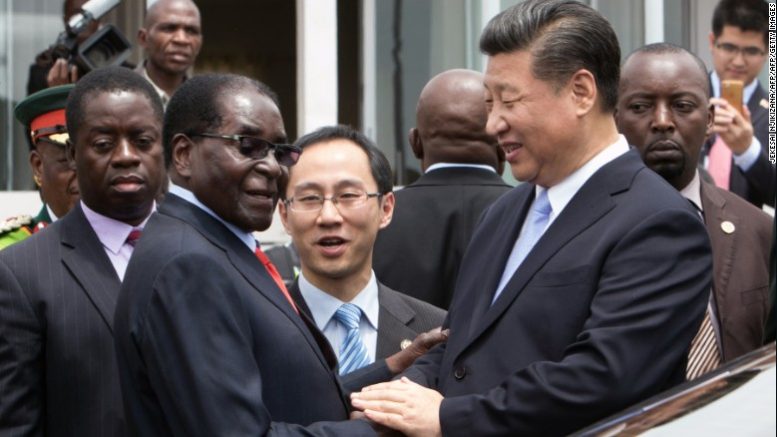
Michael Onas
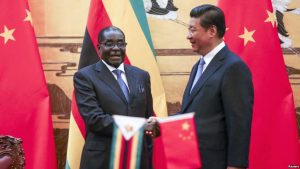
Zimbabwe’s President Robert Mugabe (L) and his Chinese counterpart Xi Jinping
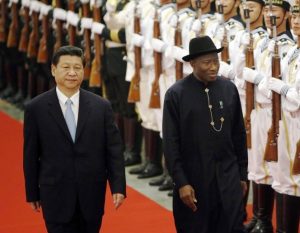
Goodluck Jonathan with Chinese leader Xi Jinping, Thursday, 18 July, 2013
China’s investment in Africa has increased 30-fold since 2005, with 2,000 Chinese firms now present in 50 African countries.
Over the past 10 years, Britain has invested the most in Africa, with 437 deals totalling US$30.5 billion, law firm Freshfields Bruckhaud Deringer said in a report this month. France came in second with 141 deals totalling US$30.5 billion. China was the third-largest investor with 49 deals worth US$20.8 billion.
“The various MOUs (memorandums of understanding) signed between Chinese and Nigerian companies will lead to stronger economic ties between the two countries,” said Goodluck Jonathan, during the visit.
In recognition of the strategic trade link between China and Nigeria, the Central Bank of Nigeria recently converted part of Nigeria’s foreign reserves from US dollars to yuan, Jonathan announced last week. During Jonathan’s visit, Beijing agreed to expand tenfold its demand for Nigerian oil from the current 20,000 barrels per day to 200,000 barrels per day as of 2015.
Many Nigerians are now discovering just how the oil revenues were mismanaged, under Jonathan’s administration. Only the current Governor of Nigeria’s Central Bank can tell us, if the decision to convert part of Nigeria’s foreign reserves from the strong and reliable US dollars to yuan has benefitted the Naira or negatively impacted the currency.
Chinese companies are already building roads across Nigeria in contracts valued at US$1.7 billion. On July 11, 2013, state-owned China Machinery Engineering Corp (CMEC) signed a US$201 million agreement to build a 120-megawatt power station, oil storage tanks and other infrastructure in the Nigerian city of Bauchi in 33 months, the Hong Kong-listed firm announced.
On the same day, CMEC signed a US$420 million contract to build a 500MW power station within 31 months in Benin City, Nigeria.
Nigeria is not the only African nation lining up for mainland funding. During a trip to China this month, Ugandan Prime Minister Amama Mbabazi visited CMEC’s headquarters in Beijing, where he said: “Our government is concentrating on a few priorities due to insufficient funding and China is to fund a number of these.”
Uganda would offer most of its infrastructure projects to Chinese companies, because they could be repaid from Uganda’s future oil revenue, unlike Western businesses that expected advance payment, Bloomberg quoted the office of the Ugandan prime minister as saying.
On July 8, 2013 China Harbour Engineering, a subsidiary of China Communications Construction, signed a US$700 million contract to build a new airport in Khartoum, the capital of Sudan, in 40 months. The project will be financed by a loan from the Export-Import Bank of China.
Sierra Leone President Ernest Koromo in 2013, signed US$8 billion of infrastructure deals on his visit to China.
This includes a US$1.7 billion contract with China Kingho Energy Group for the construction of a port, mine, power facilities and a 250-kilometre railway; and a US$300 million contract with China Railway International for a new international airport 60km from Freetown, the capital of Sierra Leone.
Dam builder Sinohydro on July 2 signed 13 contracts to build 3,482 flats in Algeria, said Sinohydro’s website.
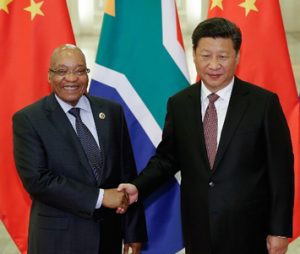
South African President Jacob Zuma (L) and Chinese President Xi Jinping
China’s economic influence across Africa is as controversial as it is irrefutable. On Friday 4 December, 2015, President Xi Jinping announced a three-year plan to boost cooperation with the African continent. The $60bn package includes 10 major projects that extend from poverty reduction to trade facilitation.
It is investments of this size that have enabled China to become, in 2013, sub-Saharan Africa’s largest export and development partner in 2013. But its engagement has not been free from criticism, with international and African voices alike citing instances of exploitation, environmental damage and a disproportionate focus on extractive activities. The row over the Chinese-owned Collum Coal Mining Industries in Zambia being a case in point.
China’s involvement in Africa to date has been dominated by Chinese’s demand for commodities.
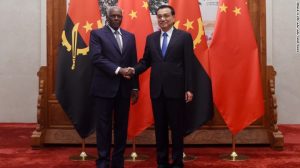
Angolan President Jose Eduardo Dos Santos (L) shakes hands with Chinese Premier Li Keqiang (R)
On April 15, 2016, President Buhari during his visit to China stated that he is profoundly satisfied with the nature of business and the dividends it has yielded.
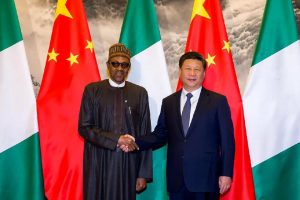
President Buhari and Chinese President Xi Jinping
He believes that the investments secured by the trip will go a long way in helping the Nigerian economy especially in sectors such Agriculture, power, railway transportation and so on.
In the power sector, North South Power Company Limited and Sinohydro Corporation Limited signed an agreement valued at $478,657,941.28 for the construction of 300 Mega Watts solar power in Shiriro, Niger State.
In the solid minerals sector, Granite and Marble Nigeria Limited and Shanghai Shibang signed an agreement valued at $55 million for the construction and equipping of granite mining plant in Nigeria.
A total of $1 billion is to be invested in the development of a greenfield expressway for Abuja-Ibadan-Lagos under an agreement reached by the Infrastructure Bank and Sinohydro Corporation Limited.
For the housing sector, both companies also sealed a $250 million deal to develop an ultra modern 27-storey high-rise complex and a $2.5 billion agreement for the development of the Lagos Metro Rail Transit Red Line project.
Other agreements announced and signed during the visit include a $1 billion for the establishment of a Hi-tech industrial park in Ogun-Guangdong Free Trade Zone in Igbesa, Ogun State.
Furthermore, the Ogun-Guangdong Free Trade Zone and CNG (Nigeria) Investment Limited also signed an agreement valued at $200 million for the construction of two 500MT/day float gas facilities.
An agreement valued at $363 million for the establishment of a comprehensive farm and downstream industrial park in Kogi state was also announced at the Nigeria-China business forum.
Other agreements undergoing negotiations include a $500 million project for the provision of television broadcast equipment and a $25 million facility for production of pre-paid smart meters between Mojec International Limited and Microstar Company Limited.
About 100 Nigerian businesses and 300 Chinese firms participated in the Nigeria-China business forum which took place a day after President Buhari began his visit to China.

